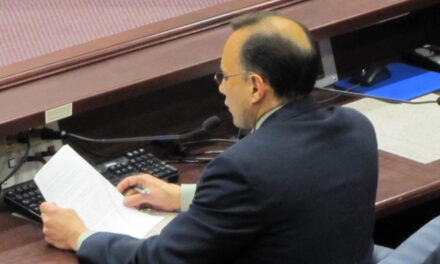We publish this Op.Ed. written by State Representative Jack Flanagan, (R-Brookline) Majority Leader of the NH House of Representatives rearding The General Court’s budget standoff with Governor Margaret Wood Hassan. ~Publis
Over the last week, we have heard the word “compromise” used more times than we did during the entire 2015 legislative session, which lasted from January through June. What seems to be lost in the most recent phase of the budget debate is what truly defines a compromise, and why it is important to reflect on how the House and Senate majorities came to the final budget bill that was passed in June and then vetoed by Governor Hassan.
Republicans did not disagree with the entirety of the governor’s proposal. In fact, as is customary, the legislature’s budget was built using the governor’s version as the baseline, and many of the line items were left unchanged or differed only slightly. Although we had some very strong philosophical disagreements on how government should be funded, such as the tax and fee increases that we eventually removed, there was a mutual recognition that this budget needed to address several major priorities.
Our collective attention will always focus on the major differences between proposals, but there has been little attention given to the attempts the legislature made to meet the governor, all or most of the way, on many areas of the budget. Unfortunately, the numbers demonstrate that despite the good faith and intentions exhibited throughout the process, the legislature’s best efforts to find common ground with the governor have been rejected, overlooked, or mischaracterized.
The responsible budget plan adopted by the House and Senate meets the needs of New Hampshire through an $11.3 billion spending plan focusing on several shared priorities including local and higher education, addiction treatment and recovery, transportation and infrastructure, and state aid to cities and towns. This a $600 million or 5% increase in funding over the next two years. The governor’s proposal would have spent $11.5 billion or 6% more than our last two year budget. The spending formulas to get to those totals may differ slightly, but in the end, the Republican legislature met the Governor 99% of the way. However, 99% was not good enough.
Our experts on the House and Senate Finance and Ways and Means committees were able to find a way to reach 99% without raising any tax or fee in our budget. In addition, we were able to rebuild our state’s Rainy Day Fund, helping to better ensure our fiscal security, and lower our business tax rate which ranks among the highest in the nation. Lastly, our budget is balanced, has no projected deficit, and only spends money we can reasonably expect to bring in. Keeping all of these campaign promises was deemed unacceptable, and the governor’s veto places government, our businesses and our taxpayers in a state of uncertainty.
The budget proposed by the House and Senate majorities pledged an increase of $42 million to fund services related to addiction treatment and recovery; a 75% increase. However, for Governor Hassan, a 75% increase was not good enough. The governor’s veto has placed us in an interim position of a 0% increase.
The legislature’s proposal would have increased Department of Transportation funding by $84 million over the next 2 years. An $84 million increase was not good enough, and the governor’s veto has resulted in no new dollars for our Transportation department.
Our budget included an increase of more than $300 million, for a total of over $4 billion in funding for the Department of Health and Human Services, to carry out their multitude of services that are vital to our State. A $300 million increase was not good enough, and advancements in care and services are on hold as a result of the governor’s veto.
What most would deem as thoughtful and reasonable attempts at compromise over the last four months, the product of countless hours of research, phone calls, and consultations with stakeholders and constituents, was met with a glass-half-empty mentality. The legislature’s budget will do more for the State of New Hampshire than a veto ever could, and would have immediately begun addressing the state’s most serious priorities.
The basis for the veto represents a very small portion of the budget, but it has major consequences for our state by holding back much needed funding for many services we rely on. It is time for the governor to accept that the budget she vetoed is likely the best budget, from her perspective, likely to pass the legislature this term. Any attempt to characterize it as inadequate is unfair to our constituents – the people of New Hampshire who would benefit with its immediate passage.
It is also time for Governor Hassan to ask legislators of her political party to support overriding her veto, so we can move forward in the best interests of our State, and fulfil our solemn duty to govern in a responsible manner.




